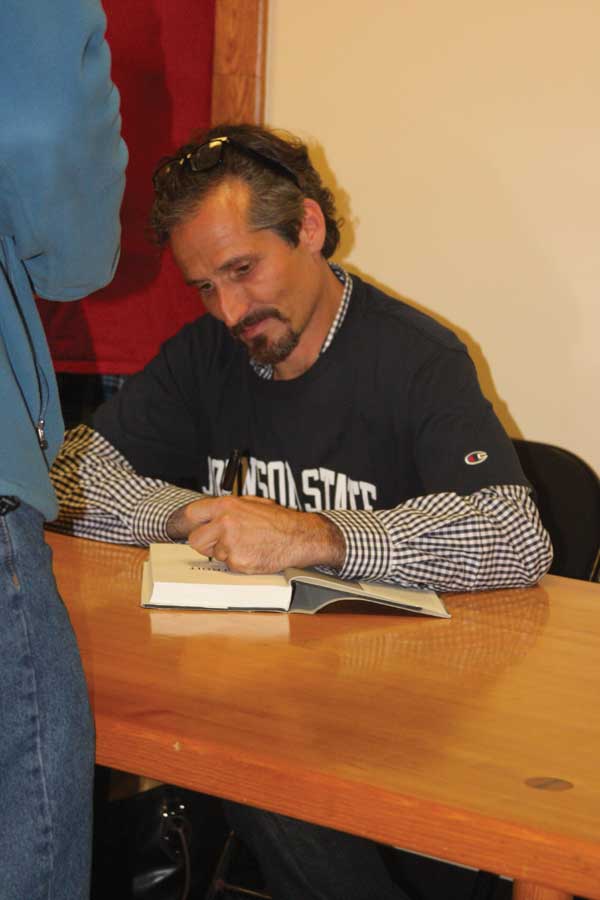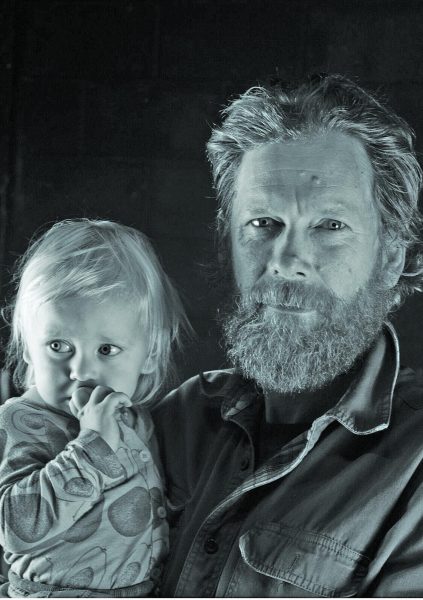Charlie LeDuff verbally dissects America
Charlie LeDuff signs a copy of his book “Detroit: An American Autopsy.”
The best picture to accompany an article on Charlie LeDuff would have been when he was standing beside the podium on Dibden Stage, one hand on the crotch of his jeans as he gently caressed his testicles in front of the auditorium packed with JSC students Thursday, Sept. 26. The fondling was a reenactment from a part of his book wherein he is interviewing a Detroit City councilwoman and she did some investigating of her own.
But like so many things about LeDuff, it happened too fast. He has a lot going on; he was the author who wrote the book “Detroit: An American Autopsy,” the reporter who ate cat food with a man suffering from MS in a satirical demonstration against Meals on Wheels contracting prison food for the elderly, and the same man who just earlier this year was accused of urinating in public and then biting a security guard’s finger on St. Patrick’s Day.
At the very least, one can say that LeDuff lives up to his journalistic motto: Don’t be boring.
So to the JSC audience Thursday night he talked about politics (in direct and cutting statements), let the crowd pick from parts of his book to reenact (complete with sultry swinging of the hips and groping when called for), and then let the students ask questions (which were answered with humor and pithiness).
He verbally dissected America, comparing it to the dying and bankrupt city he lovingly wrote about. As a country we are being “killed by our own inventions” such as cars and computers.
“We’re scared,” he said. “We don’t want to look like Detroit. But we do.”
He apologized for the “snake pit of politics” not doing enough for the next generation and leaving a defiled planet for others to deal with. To an invisible crowd of lawmakers he yelled, “Clean this shit up!” To the student crowd he said, “We will fix it. Fix it for you.”
What we have is an oligarchy, he said, where rich people are getting their way in our economic confusion. Corporate profits are negative, he said, and the financial sector has bought out the white house. The government thinks our money is at its, he said. How are we ever to pay off our debt?
“Seventeen trillion – how will we pay that back flipping burgers,” he asked. “I come from a place where we used to make shit. Now we don’t.”
He read a few vignettes from his book, miming some of the funnier ones, such as when Councilwoman Monica Conyers allegedly felt his nether region. Another amusing snippet involved the same woman arguing with a 13-year-old girl on whether she could have chose a better action than to call the president pro-tem of the Detroit City Council “Shrek.” (You read that correctly; the 13-year old was admonishing the councilwoman for calling the president Shrek.)
But, as expected from a book that suggests it is dissecting death, not every story left you laughing from its absurdity. Some, like the recounting the death of his sister Nicole, dipped you into the melancholy that shrouds a person who loses a loved one.
When LeDuff spoke about things that really made him emotional, his demeanor changed. Less sarcasm, more words spoken in cadence. Almost rap, almost poetry. Reading the chapter about his sister and her death was one of these reverent moments. He made no apology for his sister, who struggled to make a living in the dying city as a prostitute, and died trying escape to from a speeding van but ended up leaping into a tree.
Much of LeDuff’s presentation was a wind blowing away the political smokescreen. As a nation we are not fine and the recession is not nearly over. He said we need to do a lot of cleaning up, starting with our elected officials. But he isn’t a pessimist.
When he was asked if he thought there was anything worth being optimistic about, he said his kid is doing well. He counseled the students to “be honorable.” Know that what anyone builds eventually falls.
“Rome fell,” he said. “Have you been to Rome? They’ve got nice shoes, cappuccino, and good hair-cuts!”
He sees a great future for America where we can go back to values of working, saving, talking to our neighbors and taking care of our kids. He sees beauty in the “regular stuff” like his daughter getting better at soccer and watching her blossom despite living in a withering city.
Before he got off stage he invited everyone in the auditorium to flood the Hub with him after he signed students’ copies of his book.
It’s truly a shame there’s no accompanying picture of LeDuff groping himself on Dibden stage. It really would have captured his spirit. It would be honest and actual, but most of all, it would not be boring.










